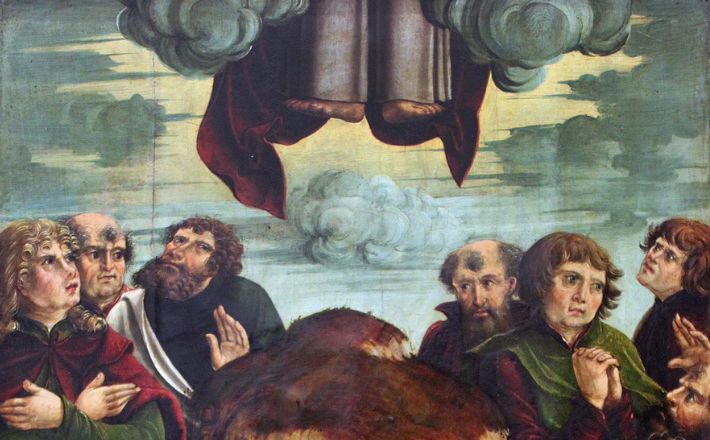Commentary on Psalm 47
Since ancient times Psalm 47 has been used for worship.1 It is plain to see why Christians have used it on Ascension Day. “God has gone up with a shout” (verse 5) brings to mind Jesus’ ascent into heaven. “The early church used the psalm to celebrate the ascension of Jesus, a practice that is commonly followed still in the liturgy of many churches,” observes biblical scholar James Luther Mays.2
But long before Easter, Psalm 47 had a place in Israel’s worship. It is an enthronement psalm, not for an earthly king but for God. In Psalm 47, the Lord reigns. Psalm 47 proclaims that God is in heaven, ruling over earth.3 The psalm summits in verse 5: “God has gone up with a shout, the LORD with the sound of the trumpet.” Some scholars have supposed that 47:5 envisions the entrance of God into the sanctuary, symbolized by the procession of the holy ark of the covenant. In any case Psalm 47:5 “expresses the theological heart of the psalter—God reigns!”4
Psalm 47 may be divided into two sections. Verses 1–4 begin with the cue (or command) to clap, shout, and sing. Then we hear the reason for all this joy: God “subdued peoples” and “nations” and “chose our heritage” for God’s people. God made Israel into a nation with a name and a land to dwell in. “The pride of Jacob” (verse 4) refers to the land God gave to the people, land that once belonged to other nations. In the New Testament, we find a similar expression: “Once you were not a people, but now you are God’s people; once you had not received mercy, but now you have received mercy” (1 Peter 2:10). There is a before and an after, defined by the mighty acts of God.
Next comes the (literal) high point of the psalm, verse 5 in which “God has gone up with a shout.” This may refer to a processional in worship, demonstrating that God is enthroned in the heavens. The theological meaning is that that God rules over all nations—indeed, the entire universe. Israel rejoiced in being God’s people, but also in knowing God as Lord of all, not just some local deity.
The second section of the psalm, verses 6–9, continues the joy. In verse 6 alone, the people are told four times to sing. Here’s why: God is Lord over all the peoples. “God is king over the nations.” The kings and princes—those who wield power on earth—gather to worship God. If only we could hear this psalm instead of just read it, our ears would ring with a royal fanfare of trumpets, and the clapping, shouting, and singing would be like waves crashing on the shore.
Above the joyful din come the clear notes of God’s mercy and power. In particular events in history, God is at work delivering and saving Israel. Yet in those specific acts of God, the general mercy and power of God are revealed for all nations. Since God rules over all, all who join in the worship become partakers of God’s blessings.
With this background in mind, it makes perfect sense that churches use Psalm 47 on Ascension Day. The obvious connection is that Christians applied “God has gone up with a shout” (Psalm 47:5) to Jesus being “lifted up” into the sky (Acts 1:9). But there is a deeper theological meaning, for “Jesus of Nazareth connected his career with the announcement of the reign of God (Mark 1:14–15),” observes James Luther Mays. Jesus’ whole life—his incarnation—embodies for us the reign of God. The story of Jesus up to and including the ascension became for Christians a new point of reference for “celebration of God’s rule.”5
Likewise, the text from Ephesians speaks of Christ “seated at God’s right hand in the heavenly places, far above all” earthly power. God has made Jesus’ feet “the head over all things for the church” (Ephesians 1:20–22). Therefore, the first Christians, though a small and endangered band, spread the gospel with boldness. Christ’s ascension empowered them.
In the Gospel text the risen Jesus promises the disciples that they will be “clothed with power from on high” (Luke 24:49). Luke says that Jesus was “carried up into heaven,” and the disciples “worshipped him, and returned to Jerusalem with great joy; and they were continually in the temple blessing God” (Luke 24:52). Perhaps the disciples used Psalm 47 to bless God in the temple.
On the Ascension of Our Lord, Psalm 47 imparts joy and confidence in God. The psalm may be spoken or sung, and it can also be preached. Psalm 47 includes “the memory of the past, experience of the present, and hope for the future.”6 Here is a natural outline for a three-part sermon.
Move 1: Proclaim what God has done for us in the past, including the resurrection and ascension of Jesus. Move 2: Work with our present experience as people who seek to follow Jesus, but who do not always see his reign and therefore must live by faith. But by joining in worship, we “say and act out the reality that our lives and our world have been shaped by God’s loving rule.”7 Move 3: Face the future with hope, trusting that one day the world will see the glory of God shining from the face of Christ.
Hymns that express the faith of Psalm 47 for Christian worship:
“Lift High the Cross” ELW 660 (a processional, just as Psalm 47 is a processional)
“This Is My Father’s World” ELW 824 (proclaims God’s rule over nature and history)
“Rejoice, for Christ Is King” ELW 430 (expresses joy in God’s reign)
Notes
- Commentary previously published on this website for May 12, 2013.
- James Luther Mays, Psalms (Louisville: Westminster John Knox, 1994), 188.
- James Limburg, Psalms (Louisville: Westminster John Knox, 2000), 156.
- J. Clinton McCann Jr., “Psalms,” New Interpreter’s Bible, vol. 4 (Nashville: Abingdon Press, 1996), 868.
- Mays, Psalms, 187.
- Mays, 187.
- NIB, 870.



May 29, 2025